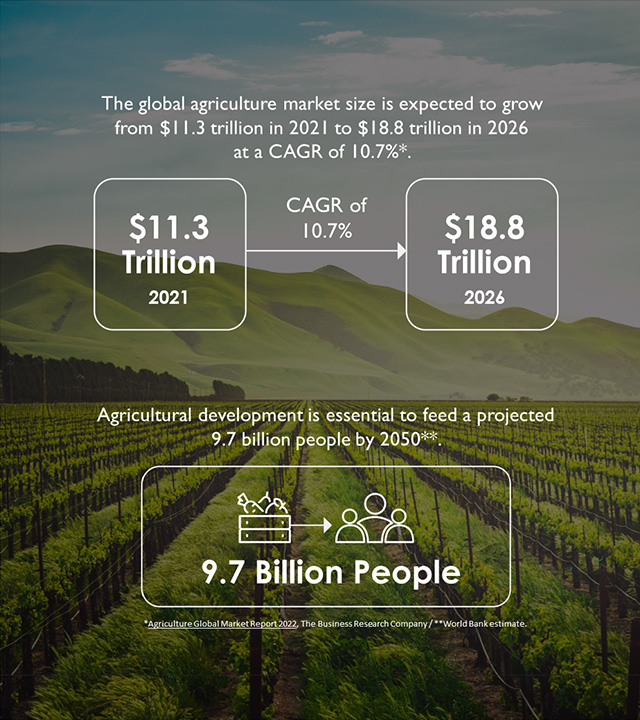Investment Highlights

Accomplished Team with Global Experience and Expertise

Extensive Global Network and Resources

Sponsor with Serial Investment, Exit and de-SPAC Experience
Competitive Edge
| Kenneth Wong | |||||||
| Jason Wong | |||||||
| Alex Davidkhanian | |||||||
| Peter Ding | |||||||
| Ronald Li | |||||||
| Albert Yu |
Target Industries
Evaluation Criteria
Our target industries constitute some of the basic needs of mankind and/or society:
- Agriculture
- Biotechnology
- Consumer Products
Evaluation of a target company will be based on ESG imperatives with a focus on continuous sustainability and growth

Agriculture
- The Russia/Ukraine war caused record highs in food prices in 2022 and continues to add uncertainty in 2023 and beyond, especially for oilseeds, for which Russia and Ukraine are key exporters
- Climate change is expected to continue to have a significant impact on global agriculture, with changing weather patterns and more frequent extreme weather events potentially disrupting crop yields, leading to rising food prices
- Geopolitical tensions in recent years led to restricted food imports/exports amongst countries, prompted world leaders to focus on initiatives and support for domestic food production and leading to favorable industry policies (e.g., low interest loans, subsidies, government funding) in various countries
- The world’s population is expected to grow by around 2 billion people by 2050, which will put increasing pressure on food production
- Advancements in agricultural technology, such as precision agriculture and vertical farming, are making it possible to produce more food with less land, water, and other resources. This could lead to increased productivity and efficiency in the sector
Sources: “2022-2031 OECD – FAO Agriculture Outlook”, OECD and FAO
Biotechnology
Sources: Grand View Research and Polaris Market Research
The sector is expected to grow at a CAGR of over 15% from 2021 to 2028, from a 2020 market value of US$750 billion.*
Valuations are relatively attractive – the Nasdaq Biotech Index is down 21.88% from its September 2021 peak.
Consumer Goods
- Despite global economic uncertainty, consumer demand for certain necessities remains strong. For example, during the COVID-19 pandemic, sales of certain consumer goods like household cleaning products, packaged foods, and personal care products increased significantly
- The COVID-19 pandemic has accelerated the shift towards e-commerce and digital channels, which created opportunities for consumer brands that are able to adapt and meet changing consumer needs
- With the rise of e-commerce, consumer brands have a greater opportunity to reach consumers directly and build brand loyalty. E-commerce has also allowed for more data-driven marketing, which can help companies better understand and target their customers
- Consumer brands that are able to differentiate themselves from competitors through innovation or unique branding may be able to capture a larger share of the market
- Strong consumer brands often have a loyal customer base, which can help to insulate them from competitive pressures and create a stable revenue stream
Sources:
1. E-commerce: At the Center of Profitable Growth in Consumer Goods, McKinsey & Company.
2. E-commerce in the Time of COVID-19, OECD.org.
Selected Transactions
Precedent 1: Pharmaceutical – Acquisition & Disposal
From 2004 to 2008, Mr. Kenneth Wong was the SVP of the Topsun Pharmaceutical Group and was responsible for:
- Acquisition of Yunnan Baiyao Pharmaceutical Group, one of the four national secret formulas in the PRC pharmaceutical industry
- Acquisition of Shanxi Guangyu Yuan Pharmaceutical Group, one of the four national secret formulas in the PRC pharmaceutical industry
- Disposal of QiDong Gaitianli Pharmaceutical Company in 2007, at a time when multinational pharmaceuticals were competing for domestic distribution network and third-tier city/suburban market share
– First major cross-border pharmaceutical M&A in the PRC
– Largest pharmaceutical private sector transaction in the PRC
Precedent 2: Agriculture / Consumer Brand – Investment and Exit
Mr. Kenneth Wong (via Keen Vision Capital) led-invested and managed US$290 million private equity investment into Huishan Dairy in 2011, at a time when confidence level for the Chinese dairy industry was at its lowest as a result of the milk scandal (melamine incident) in 2008:
-
- First offshore investment into the Chinese dairy sector when valuation was still at its lowest
- Lead-investor and lead-manager
– Structuring of investment and legal structure
– Negotiation of terms and conditions
– Closing and settlement - Successful disposal of investment stake in 2014








